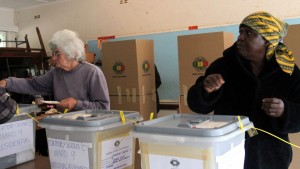 Having said this, we welcome the introduction of the biometric voter registration system with all its challenges. B.V.R can only work effectively if it is accompanied by a broader swathe of institutional and legislative reforms. It is our contention that barely 16 months before the election, there is no clear election roadmap. At best there is neither a road nor a map. Critically the Crisis in Zimbabwe Coalition notes and laments the following components of the electoral process.
Having said this, we welcome the introduction of the biometric voter registration system with all its challenges. B.V.R can only work effectively if it is accompanied by a broader swathe of institutional and legislative reforms. It is our contention that barely 16 months before the election, there is no clear election roadmap. At best there is neither a road nor a map. Critically the Crisis in Zimbabwe Coalition notes and laments the following components of the electoral process.
- Untimely implementation of the Biometric Voter Registration. B.V.R was recommended by civil society after the contested 2005, 2008, 2013 elections as a credible method of minimizing election fraud. B.V. R will also ensure that a new voters roll is in place. However, if poorly implemented, B.V R can be a monumental disaster and can result in political parties which have the advantage of incumbency e.g the ruling party, to use prior information to have all their members registered. Since B.V.R captures physical and behavioural features such as fingerprints, the face, iris, signatures etc it can be used as a tool of intimidating people especially in rural areas to the effect that their voting patterns are being monitored. There must be sufficient time in educating and informing the voting public about B.V.R in order for it to be effective.
- Steps must be taken to ensure that the new voters roll produced after B.V.R is accessible to stakeholders and the voting public can check whether or not they are registered.
- The Zimbabwe Electoral Commission secretariat must be demilitarized and every semblance of military or security/ intelligence presence in the Z.E.C secretariat must be flushed out as a matter of urgency in order to instill confidence in the electoral body.
- The public media must be depoliticized and all parties must be given equal access to electronic and print media both public and private. The state broadcaster for example must not, as it has become the public relations arm of the ruling party. Section 155 of the Constitution speaks clearly about the imperative of fair access to the media.
- Partisan distribution of food aid must be stopped as it is undemocratic and unconstitutional. Public figures must stop distributing inputs, tractors, rice, maize and clothing secured by government on behalf of the people on party lines.
- Traditional leaders must not be used as commissars for political parties as is still the case in many rural areas where traditional leaders are used to mobilize people for meetings of the ruling party. This is a clear violation of section 281 of the Constitution and the Traditional Leaders Act.
- Some senior members of the security establishment continue to embed themselves in partisan politics and openly siding with the ruling party. This is a violation of the Constitution.
- Government officials and bureaucrats still being used as an extension of the ruling party.
- The slow pace of Constitutional alignment is a cause of concern.
- Civil society organizations and ordinary citizens continue to be denied space to exercise freedom of assembly and association. Organizations are forced to notify the police about all meetings and those without memorandum of understanding are subjected to persecution.
Recommendations:
- As a Coalition we propose that the Biometric Voter Registration and other attendant processes such as birth registration, access to National I.D’s be speeded up and the process should be spread out over a year to give people a chance to understand the process and to check whether the system works.
- There must be widespread civic education by ZEC and civil society to ensure that people have all the necessary information to participate in elections.
- The public media space must be opened up to allow for a diversity of voices as the election period spans for over a year and not a few months.
- Space must be opened for civil society organizations to carry out civic education on elections. Local, regional and international observers must be accredited on time to monitor both the B.V.R process and the actual election process.
- Tenets of the SADC Principles and Guidelines on the Conduct of Democratic Elections must be applied in full.


